What are the best solar panels to put on an Australian roof in 2022?
I think the best people to answer that question are professional, Australian installers.
Installers:
a) work with the different panel brands every day.
b) must support those panels for the duration of their 10-40 year warranties.
Australian Consumer Law says the company selling you a product has ultimate responsibility for honouring the manufacturer’s warranty. So any installer planning on being in business for the long term should only sell panels they are very confident in.
We started surveying installers in the SolarQuotes network about their favourite solar panel brands in 2021.
We asked our installers again what they thought were the best solar panels in 2023. See which brands came out on top!
The SolarQuotes Installers’ Choice Awards 2022
We asked the 400+ installers in the SQ network two questions:
- What solar panel brand would you put on your own roof in 2022 – if money was no object?
- What solar panel brand would you put on your own roof in 2022 – if money was tight – and every dollar counts?
The results demonstrate what brands the installers trust for both top-of-the-range solar systems and – just as importantly – for quality budget systems.
Note: Choosing good brands is important, but you also need to ensure the system is well installed. The difference between a good and bad solar installation makes all the difference.
Here are the results:
Best High-End Solar Panels In Australia: 2022 (Money No Object)
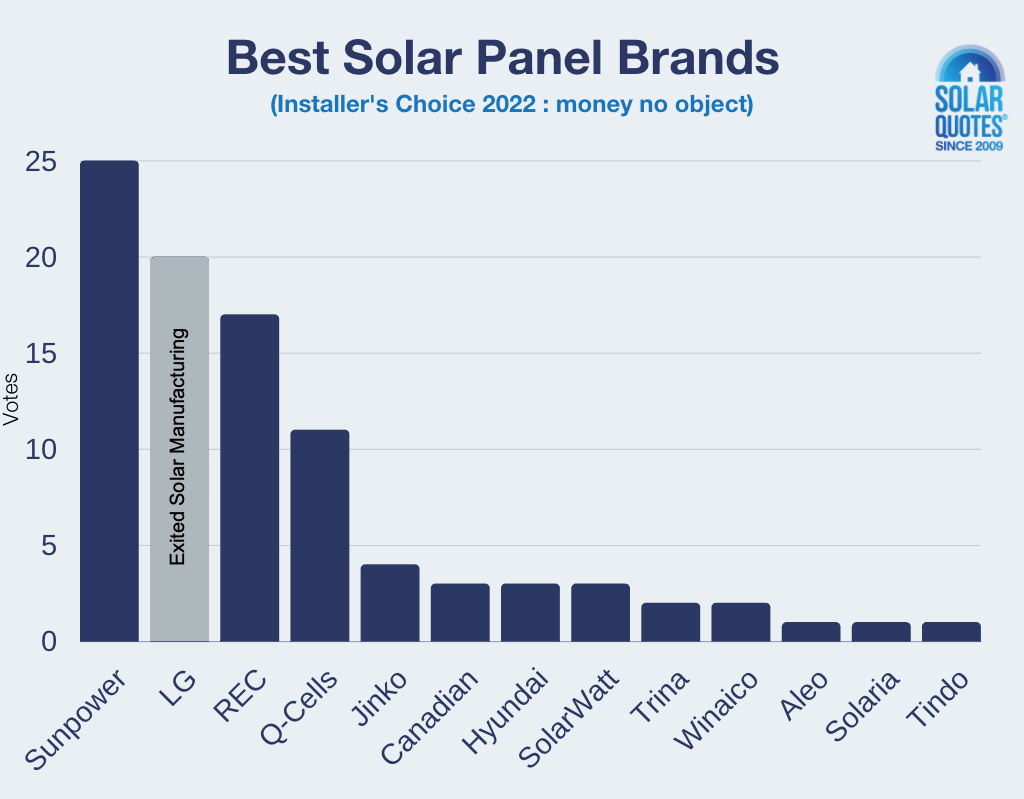
LG decided to stop manufacturing modules just after the survey results came in. See the footnote at the end of this post.
We asked SolarQuotes installers:
What solar panel brand would you put on your own roof if money was no object?
Here’s what they told us their favourite ‘top of the range’ brands are in 2022:
First Place: SunPower (27% of votes)
SunPower has always been one of the go-to premium panels for Australian solar installers, storming up from 3rd place last year to first place this year.
Just last month, SunPower announced an astonishing 40-year product warranty on their Maxeon panels. As a publicly listed company, to make such a courageous move, it would be a good bet that they have a lot of empirical evidence those Maxeon panels will last well beyond 40 years.
Personally, I love SunPower panels. However, their top-end Maxeon panels are very pricey. Expect to pay three times more per watt than a good budget panel.
If you still want the SunPower brand – but prefer to spend a little less money – their P Series ‘shingled’ panels are worth consideration at almost half the cost of the Maxeon. And if you are a micro-inverter fan, you can get AC versions of all the SunPower models with an Enphase IQ7 micro-inverter preinstalled at the factory.
You can see 706 user reviews of SunPower panels here. Australian homeowners are pleased with their SunPower modules – with many commenting on their aesthetics:
“So far the panels have been working brilliantly and generating plenty of power, even on cloudy days. As a bonus, the panels look great, very sleek!“
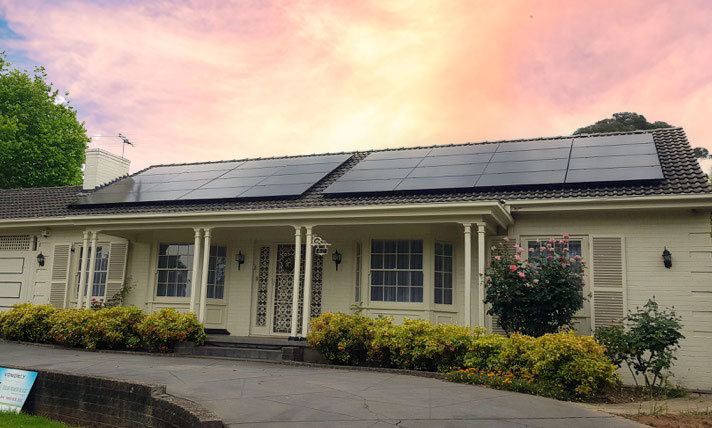
SunPower installed by Venergy
Second Place: REC Solar (18% of votes)
Keeping their well-deserved second place from 2021 is REC Solar, whose line of Alpha panels peaks at 410W and are revered amongst those who install them.
New for 2022 is the REC Alpha Pure promising lead-free construction. You can see 652 ratings for REC solar panels from Australian homeowners here. You’ll see that they have an average of 4.8 stars and comments such as:
“We got Alpha black panel and we are really pleased they look great and they are performing really well.“
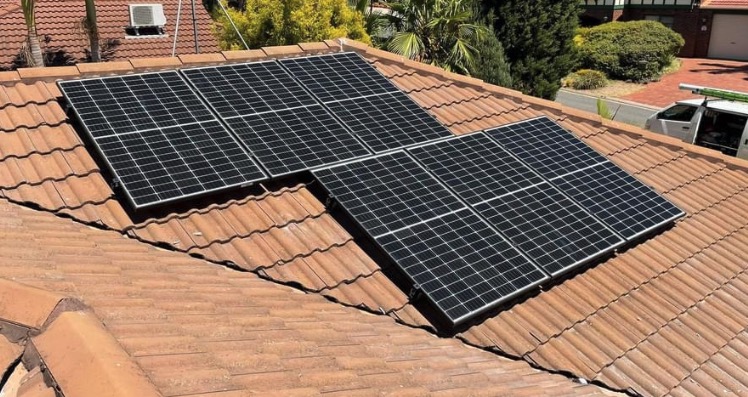
REC panels installed by Deionno Electrical
Third Place: Hanwha Q-Cells (12% of votes)
Q-Cells is new to the ‘Australia’s Greatest Solar Panel Brands’ podium for 2022.
Hanwha Q-Cells started in Germany but is now owned by giant Korean conglomerate Hanwha. Q-Cells has several panel models available in Australia, from cheapest to dearest: Q.Maxx, Q.Boost, Q.Peak and Q.Peak Duo.
Expect to pay about 20% more for the flagship Q.Peak Duo than the Q.Maxx or Q.Boost panels.
Q-Cells solar panels currently have 1194 Australian reviews with an average 4.8 stars. A common theme among reviews is their excellent low-light performance:
“Appear to work well, good production even on cloudy days.”
“The system is producing power from very early in the morning to late in the afternoon and is performing well.”
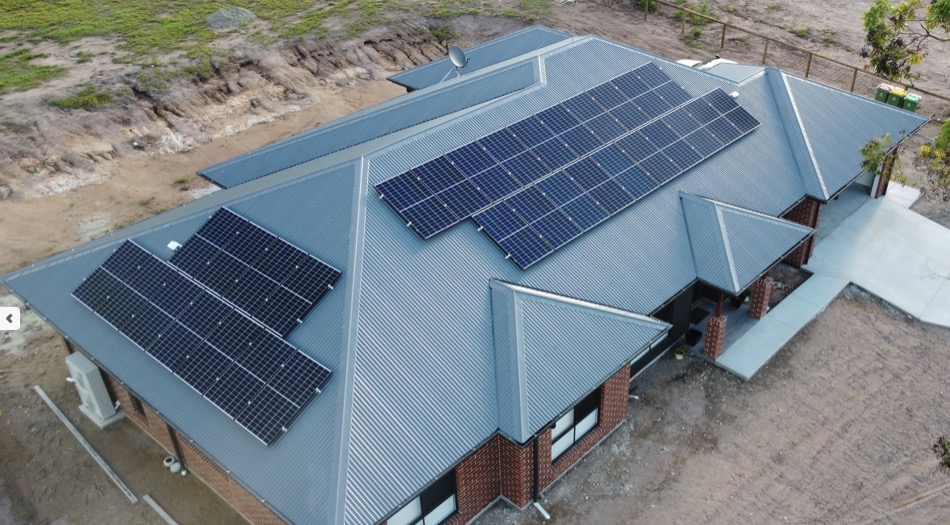
Q-CELLS installed by MC Solar & Electrical
Best Value Solar Panels In Australia: 2022 (Every Dollar Counts)
We asked installers:
What solar panel brand would you put on your own roof in 2022 if money was tight – and every dollar counts?
Here’s what they told us their best value brands are:
Best Value – First Place: Trina Solar (17% of votes)
Trina must be doing something very right. Last year they climbed from fourth to joint second-largest solar panel manufacturer globally.
And in 2022, they held on to the top spot for ‘Best Value Solar Panel in Australia’ according to SQ installers.
Australian consumers rate Trina well, with 4.7 stars average from 1305 Trina solar panel reviews.
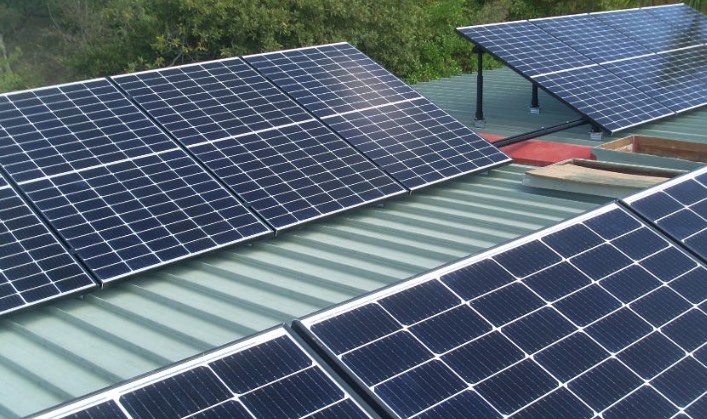
Trina panels installed by Peninsula Solar.
Best Value – Second Place: Jinko Solar (16% of votes)
Jinko is the fourth biggest solar panel manufacturer globally and holds on to their second place for ‘Best Value Solar Panels’ from 2021.
Jinko solar panel reviews average 4.7 stars with 1649 ratings from Australian owners at the time of publishing.
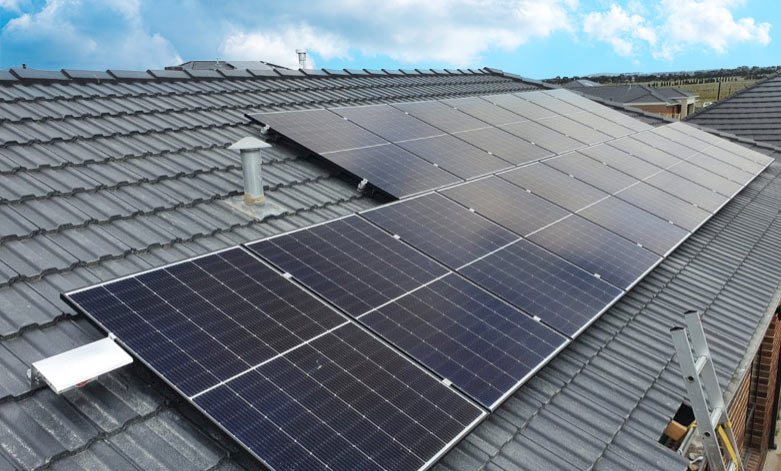
Jinko Panels installed by JWS Electrical Services.
Best Value – Joint Third Place: Canadian & Q-Cells (10% of votes each)
Q-Cells & Canadian Solar tie for third place, kicking Longi off the podium – which took 3rd in 2021.
Q-Cells have the unique honour of a podium in Best Top-End, and Best Value solar panel. Quite the achievement when Q-Cells’ cheaper Q.Maxx or Q.Boost product lines cost about 25% more than a Jinko, Trina or Canadian.
Canadian Solar also scored a well deserved 3rd place with their (not-made-in-Canada) panels having a good reputation in Australia. However Canadian Solar reviews score an average 4.7 stars compared to Q-Cells’ 4.8.
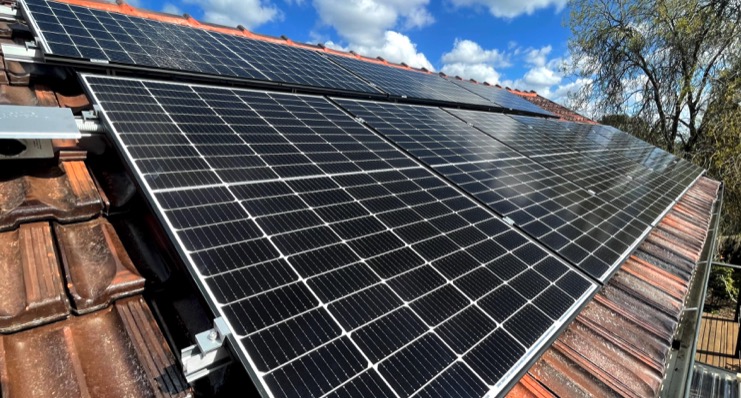
Canadian Solar panels installed by Primero Electric and Solar.
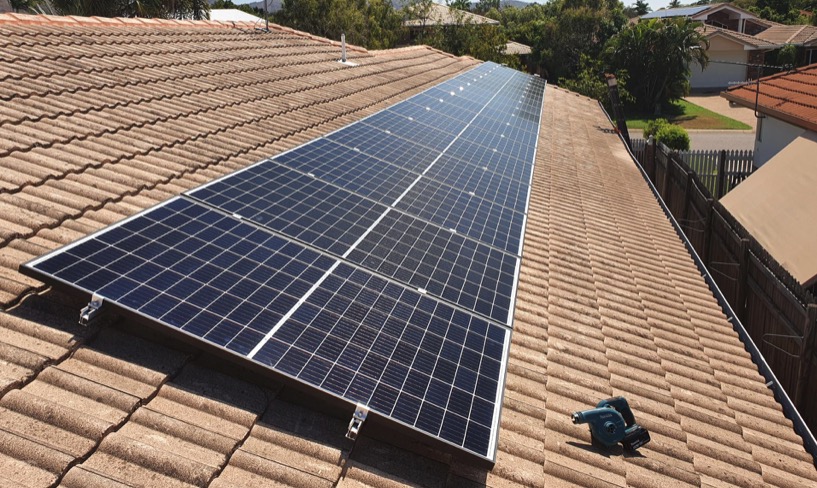
Q-Cells panels installed by Reward Energy and Cooling.
Longi Not Very Strongi In 2022?
It was interesting to see the world’s largest manufacturer, Longi, dropping down the rankings from 3rd last year to joint 6th in 2022.
We received this comment from an installer:
“Initially I would have installed the Longi in the Budget system but lately the quality of the frame has been slipping.”
Footnote on LG solar panels:
We surveyed our installers in January 2022. LG Solar received enough votes for second place in the ‘money-no-object’ awards. But in February 2022, LG Electronics announced it will stop manufacturing solar panels. In Korea, some faceless accountant must have decided a rapidly heating world really didn’t need more top-quality solar. Perhaps LG needed the money to improve the cyber security of their internet fridges?
So I removed LG panels from the podium, as you won’t be able to buy them for much longer. Happily, the company has confirmed LG will honour all warranties – as they should.
Next week I’ll reveal which inverters Australian installers voted for as the best in 2022.

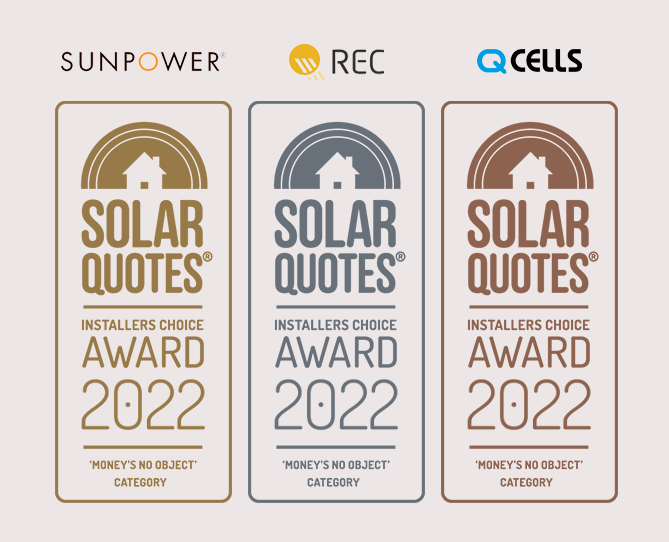
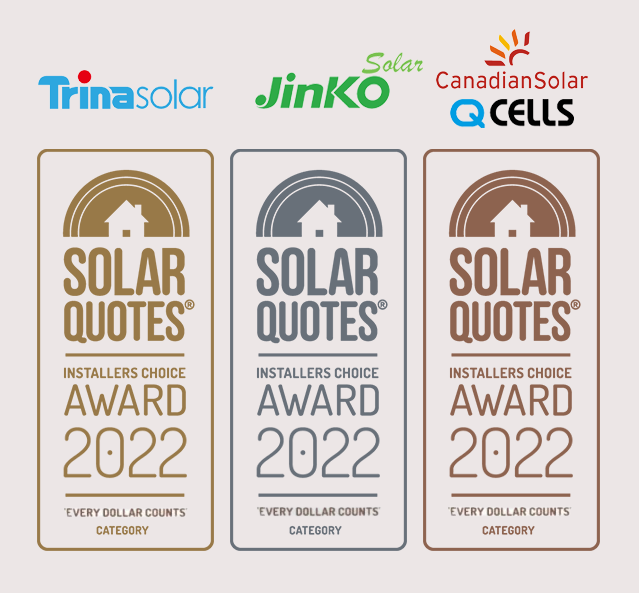
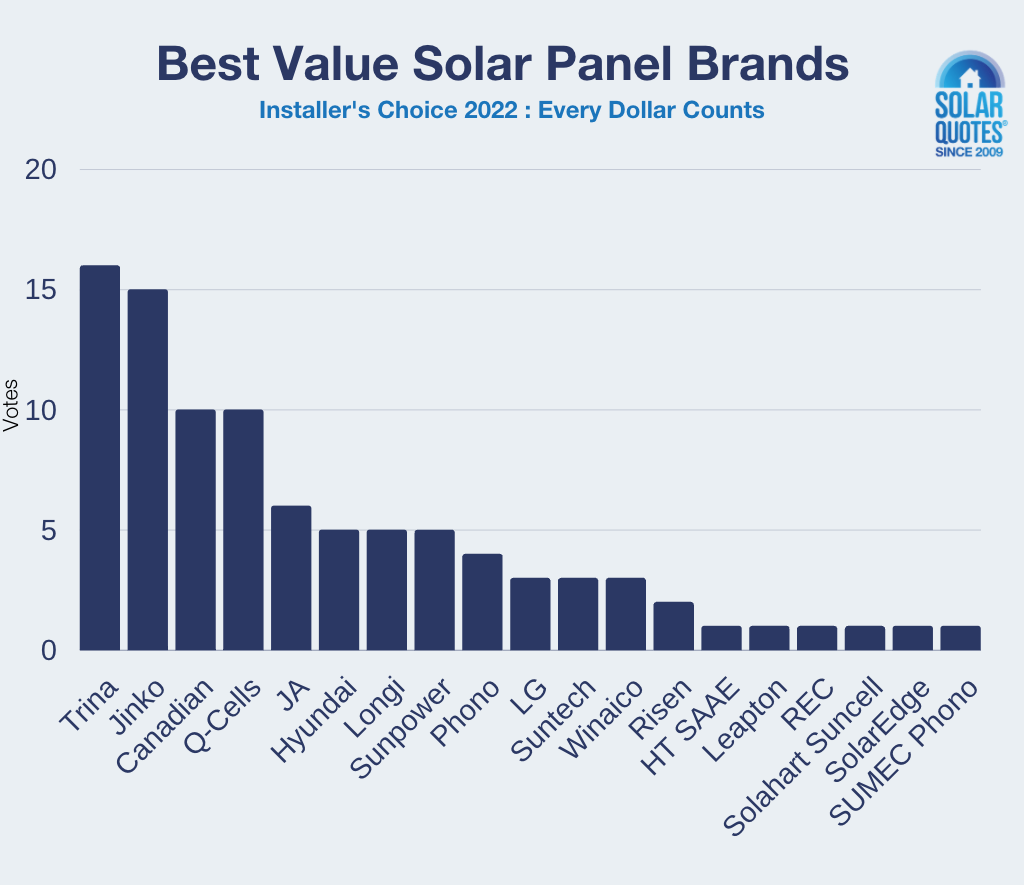
 RSS - Posts
RSS - Posts



Interesting my 16 year old Sharp solar panels not on your list. Maybe they don’t sell in Australia (I’m from So. California). I know they replaced one of mine two years ago, but I don’t know if they are still manufacturing today. Seems like they still produce about 90% of what they did when new.
As far as I know, Sharp solar panels have not been sold in Australia since 2012. I heard the panels were OK – but the Sharp inverters were very unreliable. Origin Energy installed a lot of them and spent millions replacing them if I remember correctly.
Sharp Japan stopped exporting panels after Fukushima, because Japan required as much solar energy as they could get to make up the difference.
A 40 year warrantee is terrific! However the associated micro-invertors as I understand it have a warrantee of 25 years. If an invertor fails after the 25 year warrantee, is it economically viable to replace the invertor on the back of a solar panel, given the +25 year age of the solar panel and the cost / complexity of lifting a panel for the repair? If it is not viable then what is the advantage of a 40 year panel warrantee? It would appear that the 40 year panel warrantee is very dependent on the micro-invertors lasting at least 15 years past their 25 year warrantee.
With the Sunpower Maxeon 5 AC panel, the 40 years only covers the panel, not the integrated microinverter, which is covered under Enphase’s 25-year warranty.
If the panel is accessible, it is an easy job to replace the microinverter.
I’ll just mention the 40 year warranty is also available for Maxeon panels without microinverters. This lets them be used with a string inverter which can be replaced if it fails.
Good point – thanks.
Hi Fin
What happened to LG panels?
They are good quality panels, so if you have them I’d say there’s nothing to worry about, but LG is no longer producing solar panels. I guess they decided it would no longer be profitable for them:
https://www.solarquotes.com.au/blog/lg-solar-exit-mb2368/
Can you suggest any good solsr installers on central voasy
What are Tindo doing wrong?
I thought they would have ranked higher in the ‘money no object’ category given they are pricey but seem good in comparison.
Are they simply not keeping up with innovation? or are their installers not on this forum?
The popularity of the product has nothing to do with Statistical and Scientific Facts. According to scientists, SolarWatt should be in the first place.
https://www.linkedin.com/feed/update/urn:li:activity:6920551232965144576?commentUrn=urn%3Ali%3Acomment%3A%28activity%3A6920551232965144576%2C6922404702735212544%29
Hi Finn, would you be inclined to go with Astronergy Astrosemi 370w, Risen Titan 390w or Longhi panels for a 6.6kw system?
The installer can do all of them for the same price but believes Astronergy is the superior panel in terms of output and long term reliability. Astronergy are changing to a 25yr product warranty this year but currently are 15yrs only versus Risen which are 25 years already. What do you think?
Hi Matthew, Ronald here.
Both Risen and Longi produce lower cost but reliable panels and are on our recommended panel chart in our Solar 101 Guide:
https://www.solarquotes.com.au/solar101.html
Obviously, we think the ones on our recommended chart are best, otherwise we wouldn’t have put them there. But if you are interested in the Astronergy panels they are tier one panels, which generally is an indicator of reliability.
Cheers. How come you guys don’t rate the Astronergy panels as highly as longhi or risen? According to the PV tech reports they apparently outperform all the other budget brands. Is it more a function of Australian market penetration and support rather than performance?
We simply don’t know as much about them as the other panels, and a lot of it does come down to market penetration and support. It’s unfortunate, but a company that is small but makes quality panels and does everything right could simply not have much presence and so we don’t hear much about them. But I can say Astronergy are not bad panels.
Hi Finn & Solar Quotes team. Due to an unusual and small roof configuration where a 2MPPT String inverter is not optimal without reducing our system size …..our solar installer has now switched us to a 5kw SolarEdge inverter for the individual panel optimisers. Total system size installed is 6.6kw at this stage. Would you choose between a 370W Jinko Cheetah Plus HC or a 370W LONGi Solar Hi-MO4 panel, we have been recommended Longi purely based on them offering a longer warranty of 15yrs instead of 12yrs and they have a strong stable future in solar technology? I have read through your website and the many reviews and unsure if one is really better than the other? I would welcome your opinion, thankyou.
Hi Amber, Ronald here.
Those are both panels we can recommend and there’s not much difference between them. Their ability to tolerate heat without losing efficiency is identical. I would check you are getting 15 years product warranty with the Longi panels as the Longi Australia site currently says 12 years. But even if the product warranty is the same, Longi has a slightly better performance warranty as they promise the panels will have at least 84.5% of their original capacity after 25 years, while Jinko promises 83.1%. Both companies are very large manufacturers of solar panels, with Jinko being the largest in the world. I’d expect both to be around long term, but it’s not possible for me to be certain of that. Either panel will be fine and neither should cause you any problems.
Starting this research the advice is so conflicting. What would YOU choose for long term effectivity, efficiency, safety and performance between AC micro inverters and DC main inverter? Trying to fine this point down to eliminate some suppliers before we look at brands and choosing for longevity, maintenance etc
Hi Finn, I am in the process of working through quotes from your suppliers to put 39kw of solar on my roof and contractors are quoting 415w Jinko Tiger panels, 580W QPeak and 370W Seraphim Blade. What way would you go, or would you suggest something else?
Hi Graham, Ronald here.
That’s a big solar system. Those are all panels we recommend and you can expect them all to last for decades on your roof without problem. The Jinko Tiger panels are likely to have a 15 year product warranty, the QPeak 25 years, and the Seraphim Blade 15 years. If you want the extra peace of mind you can get the QPeak panels with the 25 year product warranty, but note they are likely to cost more.
Which panels are the best performers on a backward sloping (15 degrees) roof? Advice please.
Hi Finn, I have been researching solar and had several quotes in the past which have all had an out of pocket too large for us (pensioners). Currently I have a quote for 6.6kw system with an out of pocket of $3.950 (Total cost 8K). The panels (17) are Risen Titan Module 390-400 and the Inverter Solis -Ningbo Ginlong Technologies 5kw (total inv. rating), Can you give me an idea of whether this is a reasonable quote/choice of panels/inverter. Thanks
Hi Marge, Ronald here.
We can recommend both Risen panels and Solis inverters. They are reliable pieces of solar hardware and you can expect them to operate long-term without problem. The price you have been offered is competitive and definitely a good price if it’s from an installer who does high quality work. If you got the quote through us then you can be confident the installer does good quality work. The system will also be covered by our Good Installer Guarantee:
https://www.solarquotes.com.au/installation-guarantee/
If you didn’t get quotes through us and want more quotes to see what’s available, you can get them here:
https://www.solarquotes.com.au/quote/start/
Enter your post code and then answer the questions that come up as best as you can. Because you don’t want to spend more than you need to, when the question, “What kind of system are you after?” comes up, I suggest indicating you want “A good budget system”. You will still receive a reliable, well installed system even if you indicate you want a budget one.
Hi
We are in the process of getting solar and the panels recommended by our supplier are Twinpeak 4 series. these are not mentioned here, do you know anything about them? they are using the Fronius Primo Inverter and Telsa Powerwall 2 battery.
Thanks
Julie-Ann
Hi Julie-Ann
Twinpeak 4 series panel are made by REC. They are high quality panels we can recommend and have a 25 year product warranty. Fronius inverters are very reliable and if you want a battery, then the Telsa Powerwall 2 is one of the few I can recommend.
Thats great news. Thank you very much for your response. We can now proceed with the purchase.
Have a great day.
Julie-Ann
I am looking for some advice. I will be putting panels on NE and NW facing roof planes. As the NW panels will receive ‘glancing light’ in the morning and the NE panels will receive ‘glancing light’ in the afternoon, will my system benefit by having an optimised inverter (such as SolarEdge) or would a straight string inverted do the same job. It seems to me that light hitting panels at increasing angles and then being in the shade (either early morning or later in the afternoon) would be similar to having periodic shade from trees etc. I would appreciate comments on this issue. Thanks.
Hi – I have a question. I have a 5kw Fronius Inverter and 6.6kw of QCell QPeak Duo panels. They were installed by a well rated Installer recommended by you in 2020. When first installed they were putting out 5kw. I then had a problem with the electrical safety switch tripping and the installer said it may be caused by over voltage. The company attended and adjusted the inverter to 90% output saying the original electrician didn’t put the right settings into the inverter. I then contacted Energex and they put a data logger on our power system and said the voltage was well within regulation. Since the installer changed the inverter settings I have been getting a maximum of 4.5kw output from a 5kw system. I upgraded the safety switches as I believe they were causing the fault, and haven’t had a problem since I contacted the company several times and they say they can’t do anything, as the 90% inverter limit is an Energex requirement. I have read the 90% output limit is the Fronius inverter Volt Var response made is set to OFF by default, and the electrician can enable Volt Var mode to overcome this problem. I have contacted the supplier with this information and they say they can’t do anything as it is an Energex requirement. Does this sound correct? PS – All of my neighbours (using different installers) are seeing full output from their inverters. Thanks